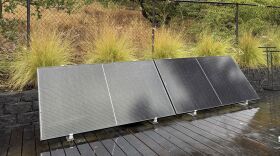Kauaʻi community members have sued the state Department of Land and Natural Resources over the environmental review of the West Kauaʻi Energy Project.
The lawsuit was filed by Pōʻai Wai Ola and Nā Kiaʻi Kai. The suit alleges that the state agency failed to require an environmental impact statement for the proposed pumped storage hydro project on Kauaʻi's west side.
The Kauaʻi Island Utility Cooperative and The AES Corporation are behind the project.
"Studies for the West Kauaʻi Energy Project have been conducted in compliance with the environmental review process as spelled out in Hawaiʻi Revised Statutes Chapter 343," a KIUC spokesperson said in a statement.
KIUC also stated that their analysis of the impacts of the project, which began more than four years ago, also included "dozens of studies and surveys, including many commensurate with the requirements of an environmental impact statement," and that "no significant impacts were identified."
The facility would divert a rolling average of 11 million gallons a day from the Waimea River on Kauaʻi. The plaintiffs said the environmental assessment submitted by KIUC does not fully address the potential harms of this stream diversion.
Water use for the project was established in a mediation agreement between KIUC and several stakeholders, including Pōʻai Wai Ola. But the plaintiff’s lawyers said the environmental assessment doesn’t meet the full terms of the agreement.
"Yes, KIUC was proposing an energy project. And yes, they would be utilizing 11 million gallons of water per day. But the agreement was meant to ensure that there would be no waste at the end of the pipe," said Elena Bryant, associate attorney at Earthjustice representing Pō‘ai Wai Ola and Nā Kia‘i Kai. "And that's what we have here with KIUC’s proposed projects that they explained in their environmental assessment.
Bryant also said that a follow-up agreement between the stakeholders set a requirement for a "one-to-one use" of diverted water for agricultural purposes.
"So basically, what that means is whatever KIUC is planning to divert and run through their energy project, that it would be met with actual agricultural use on the [Mānā] plain."
Bryant said that requirement was not addressed in the environmental assessment submitted to DLNR.
A spokesperson for DLNR said the agency does not comment on pending litigation.
AES also declined to comment at this time.






